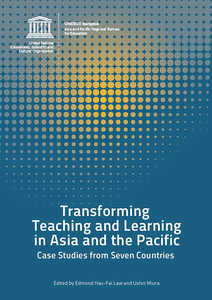
The UNESCO-UNEVOC International Centre: Who We Are | What We Do | Working With Us | Get in Touch
The UNEVOC Network: Learn About the Network | UNEVOC Network Directory
For Members: UNEVOC Centre Dashboard
Thematic Areas: Inclusion and Youth | Digital Transformation | Private Sector Engagement | SDGs and Greening TVET
Our Key Programmes & Projects: BILT: Bridging Innovation and Learning in TVET | Building TVET resilience | TVET Leadership Programme | WYSD: World Youth Skills Day
Past Activities: COVID-19 response | i-hubs project | TVET Global Forums | Virtual Conferences | YEM Knowledge Portal
Our Services & Resources: Publications | TVET Forum | TVET Country Profiles | TVETipedia Glossary | Innovative and Promising Practices | Toolkits for TVET Providers | Entrepreneurial Learning Guide
Events: Major TVET Events | UNEVOC Network News

| Publisher/s: | UNESCO Bangkok |
| Published: | 2015 |
| Licence: | CC BY |
| ISBN: | 978-92-9223-517-8 |
| ISBN online: | 978-92-9223-518-5 |
How are our teachers teaching in schools in the Asia-Pacific region? Do their pedagogical practices meet the needs of the 21st century? What is required to change teaching and learning? Through case studies on changing pedagogical landscapes in seven countries - Fiji, Indonesia, Japan, Kyrgyzstan, Nepal, the Republic of Korea, and Viet Nam - this publication reflects on these questions and explores opportunities and challenges in transforming teaching and learning.
Each chapter focuses on one country and takes a snapshot of pedagogical situations in terms of both policy and practice. While the seven countries differ greatly from each other in their historical experiences, cultures and economic and political systems, all of them have introduced similar measures to reform teaching and learning, notably to make education more ‘learner-centred’. At the same time, the seven chapters observe obstacles and difficulties in actually changing practices at the school and classroom levels, and suggest ways to facilitate the change. Through sharing these countries’ experiences, the publication will stimulate the thinking of all those interested in transforming teaching and learning that takes place in schools in their own countries.